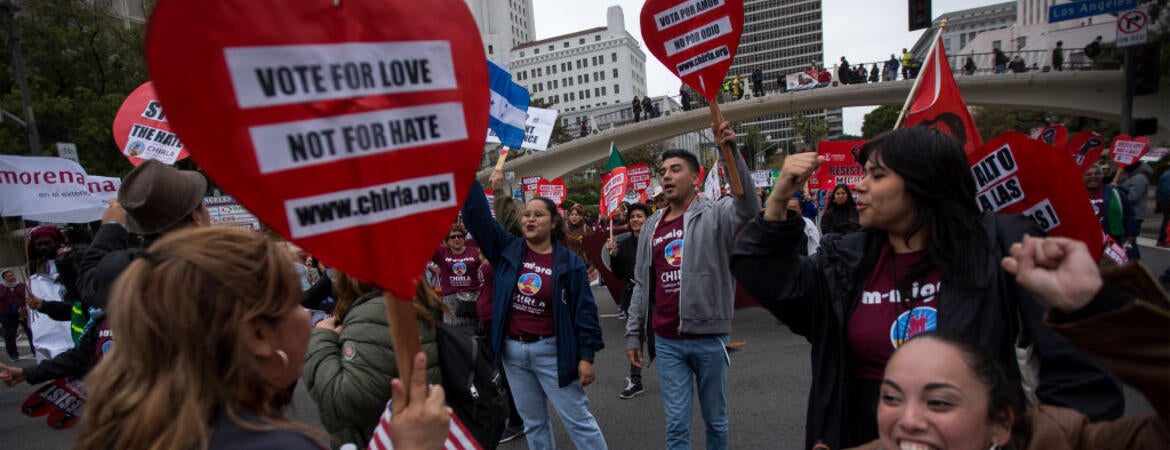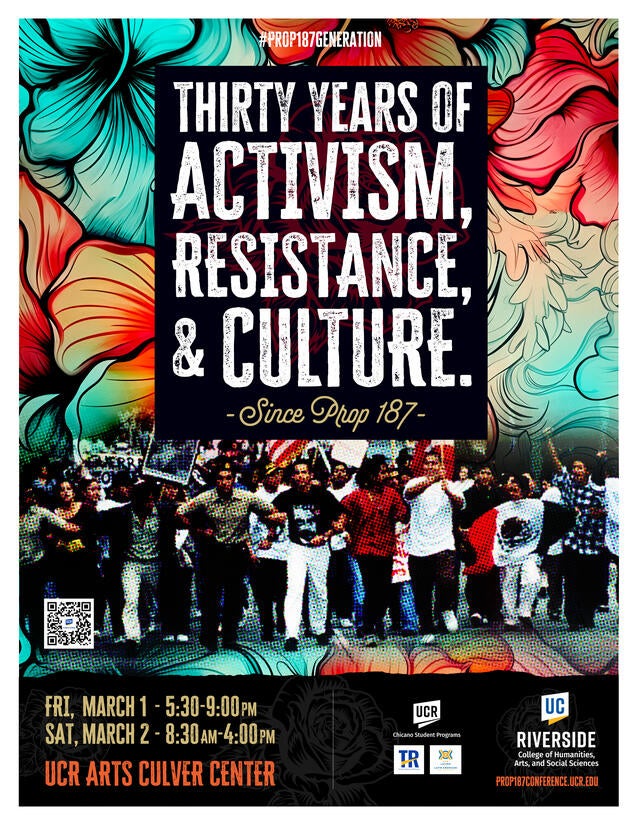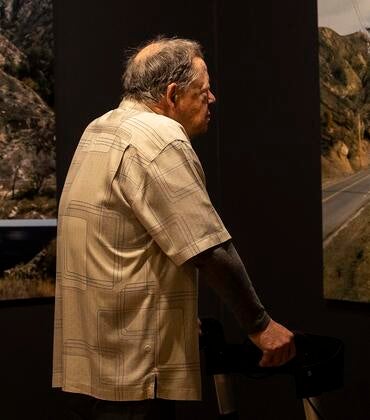
Nearly 30 years ago a short-lived California law targeting undocumented immigrants sent chills across California communities.
Proposition 187, passed by California voters in November 1994, was designed to limit public services such as public k-12 education and non-emergency healthcare for undocumented residents, a majority of whom came from Mexico and central and south American countries. The law was a response to an increase in unauthorized immigration and proponents said California’s taxpayers’ dollars were being wasted on immigrants while U.S. citizens were still feeling the effects of a recession that had hit the state in the late 1980s. Then-Gov. Pete Wilson championed the measure, framed as a “Save our State” initiative.
Prop. 187 required police, healthcare professionals, and teachers to verify and report individuals to immigration. Civil rights organizations immediately sued — a legal battle that lasted five years. Throughout the five years of legal and political challenges, Prop. 187 never fully went into effect but fear and trauma spread throughout the state.
Nearly three decades later, experts say that dark spot in history changed California — and the U.S. — because it spurred Latinos to become registered voters, attend college, and enter the political realm, among other actions.
Understanding the impacts of Prop. 187 will be part of a two-day conference hosted by the University of California, Riverside on March 1-2 at UCR ARTS in downtown Riverside. Dubbed “Unearthing the Legacy: Commemorating Thirty Years of Latino Activism and Civil Society since the Passing of Proposition 187,” the conference is a collaboration between UCR’s Latino and Latin American Studies Research Center and Alex Espinoza, Tomás Rivera Endowed Chair at UCR. The conference is free and open to the public, but registration is encouraged.
Speakers include journalist Gustavo Arellano, cartoonist Lalo Alcaraz, and many academics, poets, authors, and civil rights activists who will share about their work and impact.
“Organized resistance to Prop. 187 laid the groundwork for the current generation of Latino social movement organizing and mobilization across the United States and transnationally,” said Alfonso Gonzáles Toribio, conference co-chair and associate professor of ethnic studies at UCR. “Proposition 187 also led to the formation of a new Latino electorate in California and a new generation of Latino elected officials.”
Part of the mobilization that Gonzáles Toribio refers to is the work done by the several organizations that in 1994 promptly challenged Prop.187, including the Mexican American Legal Defense and Education Fund, or MALDEF; the American Civil Liberties Union, or ACLU; and the Coalition for Humane Immigrant Rights of Los Angeles, or CHIRLA. Their legal teams successfully overturned Prop. 187, which was deemed unconstitutional by federal courts under the Equal Protection Claus of the 14th Amendment.
That 1990s Latino activism drew on the Chicano Movement of the 1960s and included Mexican and Central American migrant activists, Indigenous, and LGBT organizations. Out of this also grew the number of Latino literary voices, said Espinoza, who is also an authored and professor of creative writing at UCR.
“Artists and creative individuals are the soul of our community. Through their production, they are able to tap into our cultural subconscious and manifest the struggles and pains, the triumphs and glories of the Latinx community in profound ways,” Espinoza said. “Each of the celebrated writers, poets, performers, and artists we’re showcasing are using their political lenses as inspiration for the production of art operating to challenge and dismantle laws and systems of power that aim to subjugate and perpetuate harmful stereotypes.”
Conference location: UCR ARTS Culver Center of the Arts, 3824 Main St. in downtown Riverside.
Parking: Parking is free on weekends and after 7 p.m. on weekdays in most parking lots.
Conference schedule
Friday, March 1
5 p.m.: Doors open
5:30 p.m.: Welcome and open remarks by Superior Court Judge Jorge C. Hernández
6-7:30 p.m.: Plenary panel
- Angela Sanbrano, J.D., co-executive director of National Day Laborer Organizing Network
- Lalo Alcaraz, cartoonist and visual media artist and television/film writer
- Roberto Lovato, author and assistant professor of English at the University of Nevada, Las Vegas
- Gustavo Arellano, Los Angeles Times columnist and author
- Emilio Amaya, executive director, San Bernardino Community Service Center, Inc.
7:30-9 p.m.: Reception with poetry by Tim Z. Hernandez
Saturday, March 2
8:30 a.m.: Continental breakfast
9-10 a.m.: Opening keynote by Mario Rios Perez, associate professor at Syracuse University’s School of Education
10-10:15 a.m.: Break
10:30 a.m.-noon: Panel — Scholarship and the Latino migrant movement
- Chris Zepeda-Millán, associate professor of public policy and Chicano/a studies at UCLA
- Ralph Armbruster-Sandoval, professor of Chicano/a studies at UCSB
- Jose Prado, professor of sociology at CSUDH
- Esther Portillo (moderator), policy advocate, Natural Resources Defense Council, former CARECEN campaign coordinator
Noon-1 p.m.: Lunch
1-1:45 p.m.: Presentation by Sarah Rafael Garcia, author, community educator and performance ethnographer
2-3:30 p.m.: Closing plenary — Intergenerational discussion
- Russell Marco Jauregui (moderator), Inland Empire immigrant rights lawyer and advocate
- Rosa Martha Zárate Macias, Inland Empire immigrant right organizer and advocate
- Laura Alfaro, artist and popular educator with the National Day Laborer Organizing Network
- Lizbeth Castillejos Abeln, Inland Empire Coalition for Immigrant Justice
3:30-4 p.m.: Break
4-4:30 p.m.: Poetry by Sara Borjas
4:30- 5 p.m.: Awards. Recipients are (in alphabetical order):
- Arturo Carmona, media leader and Latino advocate
- Ninfa Delgado, chair of the UCR Chancellor Advisory Committee for Chicano/Latino Affairs
- Paloma Esquivel, Los Angeles Times journalist
- Lupe Esquivel, former activist against Proposition 187
- Adelina Figueroa, teacher and advocate
- Eduardo Garcia, California assemblymember, 36th District
- Mark Jimenez, Immigration Attorney
- Sinar Lomeli, counselor, Mira Costa College
- Sandra Baltazar Martínez, former journalist and current senior public information officer at UCR
- Jose Medina, educator and former California assemblymember, 63rd District
- Mario Rios Perez, associate professor, Syracuse University
- Joey Rivera, former activist against Proposition 187 and Brown Beret
- David Rodriguez, Inland Empire resident and Latino leader
- Diana Rojas, graduate student, UCLA
- Roberto Tijerina, Radio Aztlán DJ and former Brown Beret




